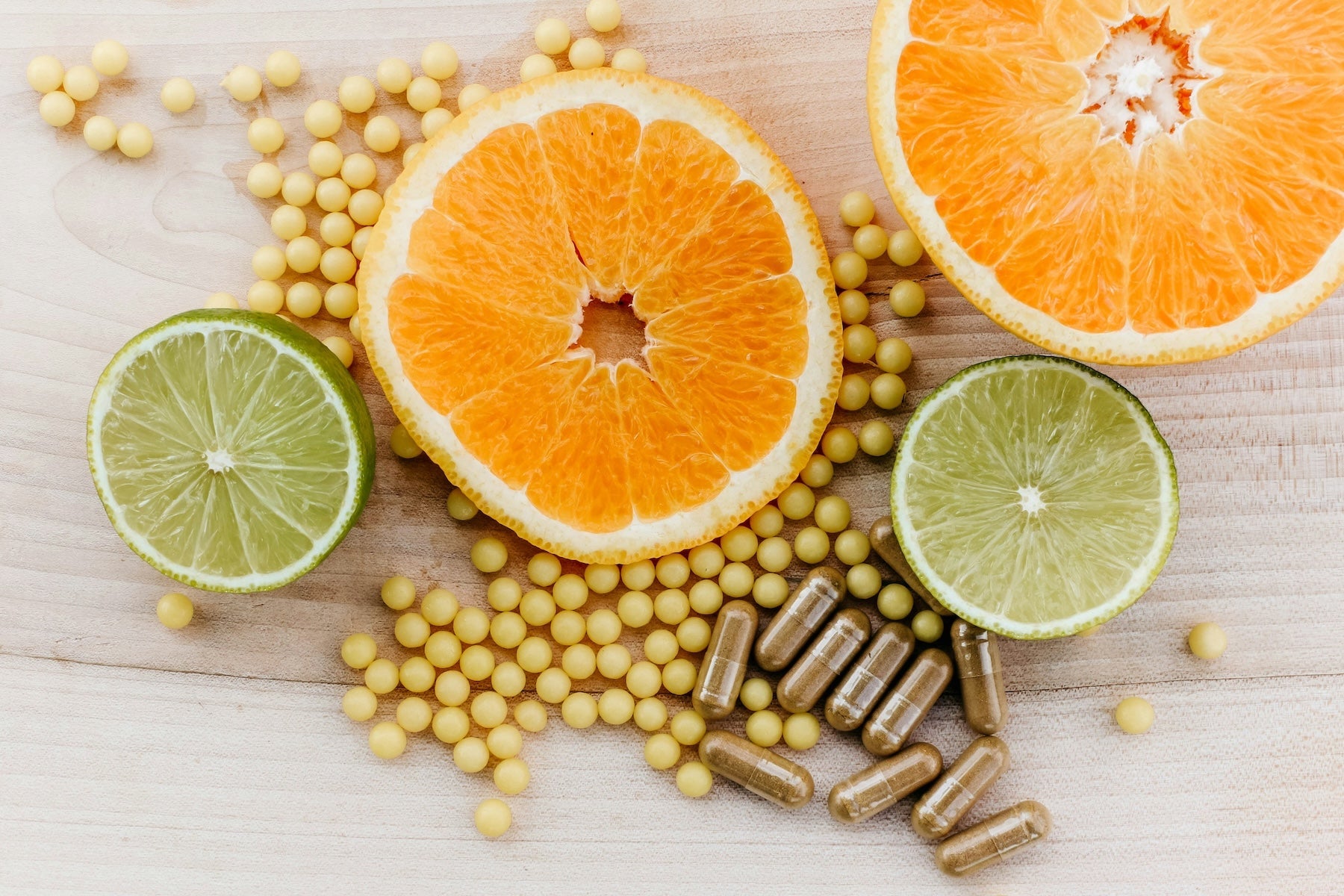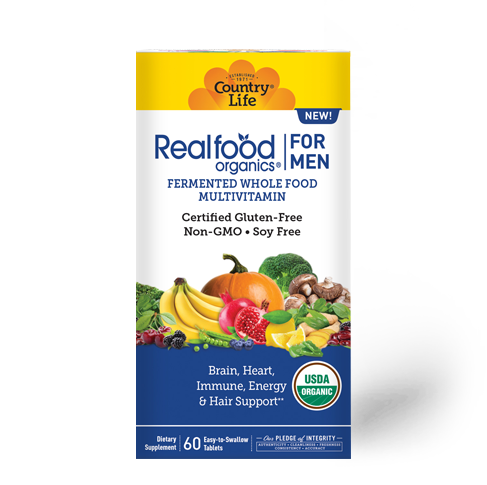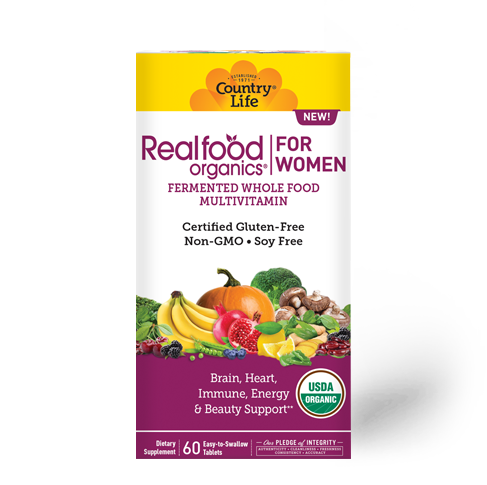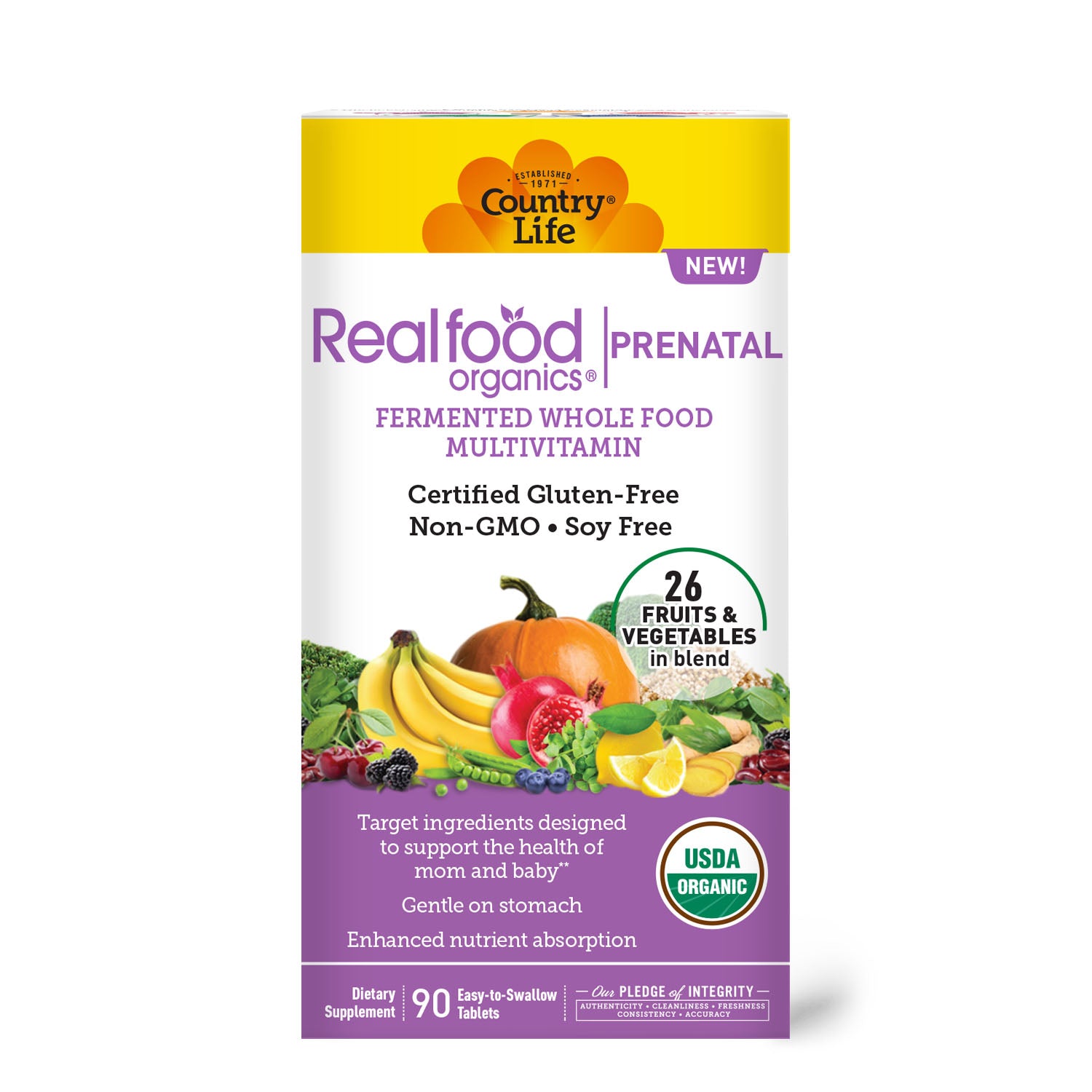Confused about the difference between whole foods or “natural” vitamins vs. synthetic?
This is a common question among health-conscious consumers, and, as with all things nutrition, the answer is nuanced.
Some studies have found no difference between synthetic and whole foods supplements in terms of nutrient status, while others suggest that whole foods vitamins have an edge.
So, which should you choose, synthetic or natural vitamins?
It depends on your nutritional needs, genetics, budget, health goals, and dietary philosophy.
So yeah, there’s a lot to consider!
Synthetic vs. Whole Foods Vitamins: What’s The Difference?
Vitamins found in natural foods and beverages are considered natural or whole foods nutrients.
Vitamins and minerals found in supplements may be synthetic (human-made) or whole-foods-based (made from natural foods).
Let’s unpack this a bit more.
Synthetic vitamins are created in labs from various natural or synthetic sources.
Examples include ascorbic acid (vitamin C), methylcobalamin (the activated form of vitamin B12), and vitamin D3 (cholecalciferol).
Whole foods vitamins and minerals are made from whole foods, like fruits, vegetables, sea vegetables, and superfoods that are typically juiced, concentrated, then dehydrated into powders.
For example, sea vegetables are often used as a source of natural iodine in whole foods supplements, fish oil is a natural source of omega-3 fatty acids, and acerola cherry is a common whole foods source of Vitamin C.
Whole foods nutrients may also be sourced from animal products, such as liver (for iron), fish or seafood (for omega-3s), or bones, skin, and cartilage (for collagen).
You can usually tell a whole foods supplement versus a synthetic one by checking the label.
Whole foods supplements are typically labeled as “whole foods,” “whole-foods-based,” “natural vitamins,” or “food-based vitamins,” while synthetic will have a simpler label.
There are also hybrid formulas that contain whole foods ingredients with synthetic vitamins, which are listed in the supplement facts box.
Companies typically offer hybrids to feature the studied benefits of both synthetic and natural nutrients in one formula.
Natural Vitamins vs. Synthetic: Which Are Better?
This is the million-dollar question hotly debated in nutrition and integrative health circles.
Why the debate?
Conflicting research makes it hard to know which forms are best for which people.
Some studies have shown specific whole foods nutrients may be better absorbed than synthetic, while others demonstrate that certain synthetic vitamins are more or equally bioavailable.
Advocates of whole foods vitamins claim they are more natural, which is true, and are therefore better recognized and absorbed by the body.
They also claim they are safer, which we’ll discuss in the next section.
On the other side of the debate are the traditionalists, who insist that the science is settled and that the body cannot tell the difference between a whole-foods vitamin and a synthetic version.
You also have pioneering researchers in nutritional science, who are discovering new ways to make synthetic vitamins more bioavailable.
New findings both affirm and contradict this consensus about how the body recognizes synthetic and natural vitamins.
For example, new understanding about how genetic variations and gut health impact nutrient absorption has made a compelling case for the use of synthetic co-enzymated (also known as methylated) B-vitamins for optimal delivery of vitamin B12 and folate.
New research suggests that binding certain minerals to amino acids, like magnesium to glycine to make magnesium glycinate, enhances bioavailability and benefits.
However, other studies show certain food-based vitamins, such as vitamin C and vitamin E, may have greater bioavailability than their synthetic cousins.
So, Which is Better, Synthetic or Whole Foods Supplements?
Nearly everyone agrees the best source of vitamins, minerals, and nutrients comes from a diverse diet rich in whole foods.
Supplements of various forms (synthetic, food-based, co-enzymated, chelated, etc.) can be excellent for filling in nutrient gaps or helping correct deficiencies or insufficiencies.
The best type for you depends on your nutritional needs, how you react to vitamins and minerals, your genetics, digestive health, your preferences and nutritional philosophy (some people just feel better about taking whole foods nutrients), your budget (synthetic or hybrid vitamins are typically less expensive than whole foods varieties), and your overall state of health.
As always, do your own research and talk to your healthcare practitioner for customized recommendations.
Are Natural Vitamins Safer Than Synthetic Vitamins?
Those in favor of whole foods supplements claim they are safer and less likely to cause side effects than synthetic versions.
This may be true for some people, but it’s not a proven theory.
Although it is true that vitamins and minerals from foods we eat are far less likely to cause toxicity than supplements, whole foods vitamins are concentrated substances, just like synthetics, and can cause toxicity if consumed in excess.
For example, taking too much supplemental iron, natural or synthetic, can cause toxicity.
This is why testing not guessing your nutrient status, and checking with your healthcare practitioner is recommended before taking dietary supplements.
Other Safety Factors to Consider When Choosing Synthetic or Whole Foods Vitamins
Vitamin form and dosage aren’t the only safety consideration when taking supplements.
One must also factor in the formulation standards and quality control and quality assurance practices of the supplement company.
For example:
- Does the company meet and exceed cGMP manufacturing practices, and can they prove it through third-party certification?
- Are they certified gluten-free?
- Do they test for contaminants like heavy metals, mold, and pathogens?
- Do they test for potency (how do you know you’re getting what is stated on the label)?
- How do they determine best by or expiration dates?
- Do they manufacture in a certified organic facility?
All these factors greatly contribute to a supplement’s safety and efficacy, whether they are whole-foods-based or synthetic.
Related reading: Do Vitamins Expire?
The Bottom Line On Synthetic vs. Natural Vitamins
If you were hoping for a straight answer on which is better, synthetic versus natural vitamins, we’re sorry to disappoint!
However, there just isn’t enough evidence to make blanket recommendations for one versus the other, which is why Country Life offers both.
Ultimately, they both have benefits and we encourage you to talk to your healthcare practitioner about which form may be best for you.
Most people can also safely experiment with something like a multivitamin, to see which type delivers the results they’re looking for.
Why Country Life Offers Synthetic & Whole Foods Vitamins
Traditionally, supplement companies have either offered exclusively whole foods vitamins or synthetic vitamins.
However, as new research emerges, many companies, including Country Life, have committed to offering both.
Our motivation for doing so is based on exciting new research demonstrating the benefits of various forms of supplements—both synthetic and natural—as well as consumer demand, which has increased for whole-food multivitamins, prenatals, and other supplements.
Some of our popular whole foods vitamins include:
- RealFood Organics® Multivitamin For Women: A complete multivitamin for women made from natural food-based vitamins, minerals, nutrients, and superfoods to support female health
- RealFood Organics® Multivitamin For Men: A complete multivitamin for men made from whole-foods based vitamins, minerals, nutrients, and superfoods
- RealFood Organics® Prenatal Multivitamin: Our new whole foods-based prenatal made with natural vitamins, minerals, and other nutrients to support a healthy pregnancy
- Realfood Organics® Aloe Vera Plus: Made with certified organic ACTIValoe® as well as supportive herbs such as ginger, turmeric, peppermint, sheep sorrel, burdock root, slippery elm, and turkey rhubarb supports digestive health and may increase absorption of key nutrients
- Omega-3 Fish Oil 1000 mg: Packed with high-quality omega-3 fatty acids, including EPA and DHA from anchovy, sardine, mackerel, herring, and salmon to support heart health, omega-3 to 6 balance, and various aspects of well-being
- Clean Grassfed Whey and Organic Vegan Protein Powders through our sister company, Biochem
Favorite hybrids include:
- Chewable Acerola 500 mg: Combines vitamin C-rich acerola cherry with a natural bioflavanoid complex and ascorbic acid for a highly bioavailable (and tasty) vitamin C supplement
- Core Daily-1® for Women Multivitamin: Combines essential vitamins and minerals, including coenzymated/methylated B-vitamins, vitamin D3, iron, and calcium, along with natural whole foods, herbs, and superfoods for women like cranberry extract, plant-based digestive enzymes, probiotics, citrus bioflavonoids, and aloe vera
- Core Daily-1® Multivitamin for Men: Combines essential nutrients, like methylated B-vitamins, zinc, vitamin D3, and vitamin C, with synergistic natural and organic whole foods, herbs, and superfoods for men, including saw palmetto, pumpkin seed extract, citrus bioflavonoids, digestive enzymes, and probiotics
And we also offer tried and true clean synthetics, like:
- Vitamin D3: Available in soft gels, gummies, and fish-free varieties, Vitamin D3 (cholecalciferol) is widely recognized as the most bioavailable form of the sunshine vitamin
- Co-Enzyme B Complex: This popular formula contains bioavailable coenzymated B vitamins, such as L-5-Methyltetrahydrofolate and methylcobalamin, which are ideal for individuals with genetic variations, like MTHFR, and other health challenges
- MAX for Vegans Multivitamin: Formulated for the specific needs of vegans with more Vitamin B12, Iron, Amino Acids, coenzymated” B-Vitamins, and more. Certified vegan, gluten-free, and kosher
- Chelated Magnesium Glycinate: This fully active form of magnesium is bound to glycine (an amino acid), offering an excellent source of bioavailable magnesium glycinate that is gentle on the stomach
What makes Country Life Supplements different?
For over 50 years, Country Life has been committed to providing the clean, potent, and tested supplements that work.
Here are a few things that make us a trusted household brand:
- All our products are made in NSF-certified gluten-free facilities
- Our supplement manufacturing facilities are NSF-Certified Organic, which holds us to a higher standard of ingredients, excipients, and manufacturing practices
- We rigorously test all our products, from raw material to finished supplement, for contaminants, purity, and potency
- We manufacture in an NSF-certified cGMP-compliant facility, ensuring we go above and beyond in implementing safe, clean, and ethical manufacturing practices
- We’re a certified B-Corp, so we care about our employees, the environment, and social welfare too
We’ve also been in business since 1971, and have pioneered various whole food and synthetic vitamin formulas that have stood the test of time, as well as an ever-changing regulatory environment.
That’s the Country Life difference.
References Mentioned in This Article
- “Synthetic vs. “Natural” Vitamins”. Realities of Nutrition.
- “Dose-dependent absorption profile of different magnesium compounds”. Biol Trace Elem Res.
- “Health benefits of fruit and vegetables are from additive and synergistic combinations of phytochemicals.” The American Journal of Clinical Nutrition.
- “Comparative Bioavailability and Utilization of Particular Forms of B12 Supplements With Potential to Mitigate B12-related Genetic Polymorphisms”. Integrative Medicine: A Clinician's Journal.
- “Bioverfügbarkeit eines natürlichen versus eines synthetischen Vitamin-B- Komplexes und deren Auswirkungen auf metabolische Prozesse [Bioavailability of natural versus synthetic B vitamins and their effects on metabolic processes]”. MMW Fortschr Med.
- “Synthetic or food-derived vitamin C--are they equally bioavailable?” Nutrients.
- “Comparative Bioavailability and Utilization of Particular Forms of B12 Supplements With Potential to Mitigate B12-related Genetic Polymorphisms”. Integrative Medicine: A Clinician's Journal.
- “Active Folate Versus Folic Acid: The Role of 5-MTHF (Methylfolate) in Human Health”. Integr Med (Encinitas).
- “Relative Efficacy of Vitamin D2 and Vitamin D3 in Improving Vitamin D Status: Systematic Review and Meta-Analysis”. Nutrients.















Share:
The Best Vitamins for Vegans & Vegetarians
Sea Moss Alternatives: How Does Arctic Kelp Compare?